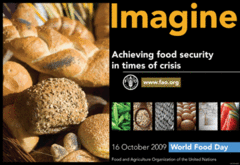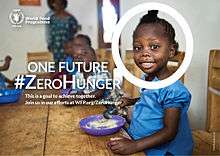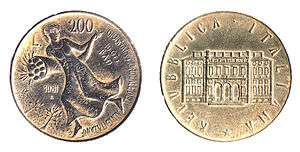World Food Day
| World Food Day | |
|---|---|
 World Food Day 2009 | |
| Observed by | All UN Member States |
| Date | 16 October |
| Next time | 16 October 2017 |
| Frequency | annual |

World Food Day is celebrated every year around the world on 16 October in honor of the date of the founding of the Food and Agriculture Organization of the United Nations in 1945. The day is celebrated widely by many other organisations concerned with food security, including the World Food Programme and the International Fund for Agricultural Development.
The World Food Day theme for 2014 was Family Farming: “Feeding the world, caring for the earth”; in 2015 it was "Social Protection and Agriculture: Breaking the Cycle of Rural Poverty"; in 2016 it is Climate Change: "Climate is changing. Food and agriculture must too",[1] which echoes the theme of 2008, and of 2002 and 1989 before that.
Origins
World Food Day (WFD) was established by FAO's Member Countries at the Organization's 20th General Conference in November 1979. The Hungarian Delegation, led by the former Hungarian Minister of Agriculture and Food Dr. Pál Romány, played an active role at the 20th Session of the FAO Conference and suggested the idea of celebrating the WFD worldwide. It has since been observed every year in more than 150 countries, raising awareness of the issues behind poverty and hunger.
Themes
Since 1981, World Food Day has adopted a different theme each year in order to highlight areas needed for action and provide a common focus.
Most of the themes revolve around agriculture because only investment in agriculture – together with support for education and health – will turn this situation around. The bulk of that investment will have to come from the private sector, with public investment playing a crucial role, especially in view of its facilitating and stimulating effect on private investment.
In spite of the importance of agriculture as the driving force in the economies of many developing countries, this vital sector is frequently starved of investment. In particular, foreign aid to agriculture has shown marked declines over the past 20 years.

- 1981: Food comes first
- 1982: Food comes first
- 1983: Food security
- 1984: Women in agriculture
- 1985: Rural poverty
- 1986: Fishermen and fishing communities
- 1987: Small farmers
- 1988: Rural youth
- 1989: Food and the environment
- 1990: Food for the future
- 1991: Trees for life
- 1992: Food and nutrition
- 1993: Harvesting nature's diversity
- 1994: Water for life
- 1995: Food for all
- 1996: Fighting hunger and malnutrition
- 1997: Investing in food security
- 1998: Women feed the world
- 1999: Youth against hunger
- 2000: A millennium free from hunger
- 2001: Fight hunger to reduce poverty
- 2002: Water: source of food security
- 2003: Working together for an international alliance against hunger
- 2004: Biodiversity for food security
- 2005: Agriculture and intercultural dialogue
- 2006: Investing in agriculture for food security
- 2007: The right to food
- 2008: World food security: the challenges of climate change and bioenergy
- 2009: Achieving food security in times of crisis
- 2010: United against hunger
- 2011: Food prices - from crisis to stability
- 2012: Agricultural cooperatives – key to feeding the world
- 2013: Sustainable Food Systems for Food Security and Nutrition
- 2014: Family Farming: “Feeding the world, caring for the earth”
- 2015: "Social Protection and Agriculture: Breaking the Cycle of Rural Poverty"
- 2016: Climate change: "Climate is changing. Food and agriculture must too"[1]
Events
In over 150 countries, events mark World Food Day. Examples of events across the world held in recent years are listed.
India
World Food Day is celebrated in honour of the date of the founding of the FAO of the United Nations in 1945. It is also now considered as Food Engineers’ Day.
United States of America
World Food Day has been a tradition in the United States since the first World Food Day in 1982. In the United States the endeavor is sponsored by 450 national, private voluntary organizations.[2] One example for World Food Day events is the World Food Day Sunday Dinners that Oxfam America sponsors in collaboration with several other non profits.[3] Emeritus Archbishop Desmond Tutu[4] and author Francis Moore Lappe[5] have teamed up with Oxfam America to promote World Food Day Sunday Dinners. The Iowa Hunger Summit has been held on or near World Food Day since 2007, and is organized by the World Food Prize in conjunction with their annual symposium in Des Moines, Iowa.[6]
Europe
In Italy, ministries, universities, research agencies, international agencies, and NGOs have organized many conferences as well as exhibitions and symposia. The Italian Ministry of Agriculture and Forestry Policies organized a meeting which focused on women's rights in rural areas in 2005.
In Germany, the Federal Ministry of Consumer Protection, Food and Agriculture have all become involved via press conferences. Spanish television has been active in broadcasting events. FAO Goodwill Ambassador – Spanish soccer star Raul – has taken part in events and helped highlight food-security issues across his country.
The UK Food Group has also been active through conferences and media broadcasts. In the emerging economies of Eastern Europe – i.e., Albania, Armenia, Croatia, Czech Republic, Georgia, Hungary, Macedonia, Moldova, Serbia and Montenegro, and Slovak Republic – a variety of activities have been held.
In Hungary, renowned experts have given presentations in the Hungarian Agricultural Museum and FAO, and WFD medals have been awarded to well-known Hungarian experts by the FAO Sub-Regional Representative.
On behalf of the Holy See, Popes John Paul II and Benedict XVI have sent an annual message for food producers and consumers on World Food Day.[7][8][9][10][11][12][13]
Africa
Angola celebrated WFD in 2005 through the 4th Forum on Rural Women, while in Burundi the second Vice-President planted potatoes to provide a symbolic example about food production. In Central African Republic, the President of the Republic has inaugurated a bridge at Boda to coincide with World Food Day, making the agricultural production area more accessible.
In Chad, thousands of people have attended debates, conferences and activities including theatre, films, folk dance, visits to project sites and visits by agricultural companies.
In Ghana, the Ministry of Food and Agriculture has hosted a food security conference, while Namibia has run an awareness campaign through national media.
Egypt has hosted a Forum on nutrition issues. Morocco and Tunisia have held seminars and exhibitions. In Nigeria, organizations and individuals involved in feeding programs (e.g. Foodbank Nigeria) connect with other stakeholders in food production, agro-allied industries, wholesalers and community-based organizations to address food security challenges. For example, since 2009, Northern Nigeria is unstable. According to the humanitarian organisation Action Against Hunger (AAH), the ongoing and deepening humanitarian crisis in Northeast Nigeria has led to the displacement of over 1.5 million people, causing four million people to experience acute food insecurity and be in need of humanitarian assistance (Action Against Hunger). Since 2010, the AAH have been working with both “national agencies” and “local communities” to build capacity to treat deadly malnutrition caused by food insecurity (Action Against Hunger).[14]
Asia
The Government of Bangladesh has been involved through organizing a food festival; in China in 2005, celebrations were organized in Qujing City, where numerous ethnical minorities live, by the Ministry of Agriculture and the Government of Qujing City, with the participation of a number of senior officials of the Government.
In the Democratic People's Republic of Korea, seminars have been held and visits made to various project sites. The Ministry of Agriculture of Indonesia has in the past organized a major Food Expo in Bandung, West Java, while a Farmers' and Fishermen's Workshop of NGOs was held in Bali.
In Armenia, staff from the Ministry of Agriculture, non-governmental organizations, Armenian State Agriculture University, the donor community, international organizations, and the mass media have participated in the World Food Day ceremony. In Afghanistan, representatives of Ministries, embassies, UN agencies, International Financial Organizations, National and International NGOs, and FAO staff have attended the World Food Day ceremony.
In Cyprus, special ceremonies have been organized in primary and secondary schools, where teachers explained the significance of World Food Day.
In Pakistan, a Society Named as MAPS (Mentor Amiable Professional Society) celebrates world food day by providing food packages to poor & née-dies and tells the importance of food to the people by organizing workshops.
Latin America
In Chile, exhibitions of indigenous food products have been prepared by local communities.
In Argentina, senior officials of the Government, academics, international organizations and the press have participated in the main ceremony. In Mexico in 2005, a National Campaign for a "Mexico Without Hunger" was held, with the involvement and support of civil society and students.
In Cuba, producers have been able to exchange views and experiences at an agricultural fair. The media strongly supports awareness campaigns on World Food Day.
In Venezuela, there has been national coverage of events.
See also
References
- 1 2 UN's World Food Day website, accessed 15 September 2016
- ↑ "Directory of Organizations". World Food Day USA.
- ↑ "World Food Day Sunday Dinner". Oxfam America.
- ↑ "Video from Archbishop Desmond Tutu on World Food Day". YouTube.
- ↑ "Video from Francis Moore Lappe on World Food Day". YouTube.
- ↑ "Iowa Hunger Summit". World Food Prize.
- ↑ "Message to the XIV World Food Day". Vatican.
- ↑ "Message to the XII World Food Day". Vatican.
- ↑ "World Food Day observed in some 150 countries". Food and Agriculture Organization of the United Nations.
- ↑ "World Food Day 2004 highlights the importance of biodiversity to global food security". Food and Agriculture Organization of the United Nations.
- ↑ "Feeding the hungry is moral obligation, pope says for World Food Day". Catholic.org.
- ↑ "Global food crisis caused by selfishness, speculation, says pope". Catholic News.
- ↑ "Pope Benedict Sends Message to Mark World Food Day". Vatican Radio.
- ↑ http://www.actionagainsthunger.org/countries/africa/nigeria Actionagainsthunger. “Action Against Hunger Logo.” Nigeria. Actionagainsthunger, n.d. Web. 03 May 2016.
External links
- World Food Day
- Food and Agriculture Organization of the United Nations
- World Summit on Food Security 2009
- World Food Programme
- Child In Need Institute agency working in India to combat malnutrition
- International Fund for Agricultural Development
- International Alliance Against Hunger
- Friends of the World Food Program United States agency helping raise funds and awareness about global hunger
- World Food Day Theme